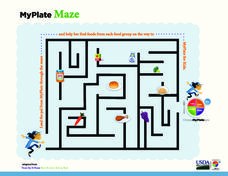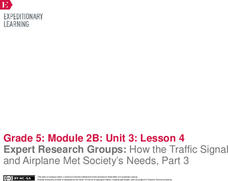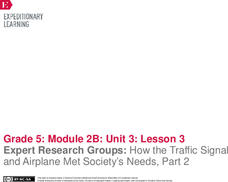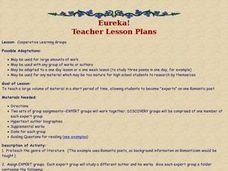Curated OER
Turning Assets into Action in the Fight Against Hunger
How can one person change the world? Scholars research and analyze the topic of world hunger. Using video clips, parodies, and primary source evidence, they uncover a current campaign to end world hunger. Collaborative groups openly...
Teach Engineering
A Simple Solution for the Circus
Class members are challenged to design a device that will move a circus elephant into a train car. Groups brainstorm ideas that use simple machines to load the elephant. They then choose one of their ideas, sketch a plan, and present it...
US Institute of Peace
Perspectives on Peace
Much like a garden, once the seeds of peace are planted, they need to be tended! How can humankind make and keep peace? The second installment in a series of 15 peacebuilding activities focuses on different perceptions of peace. The...
US Institute of Peace
What Does It Take to Be a Peacebuilder?
Is the spirit of peacebuilding already inside you? Scholars take a closer look at the characteristics of peacebuilders, past and present, in instructional activity 13 of a 15-part series. Individuals identify common traits of...
EngageNY
Reading about the Author’s Perspective: Why Do Authors Write about Natural Disasters?
It's all about perspective. Scholars view a note from the author in Eight Days. They determine the gist and discuss what they can learn about the author's background based on the note. They then complete a fishbowl activity in which they...
Missouri Department of Elementary
The Successful Student: Picturing the Successful Student
Class groups brainstorm the characteristics that make up a successful student before taking part in a whole class discussion. Assigned group roles promote member participation.
Bantam Books
The Tempest: Fishbowl Discussion Strategy
Readers learn together with a group discussion activity. As they read William Shakespeare's The Tempest, high schoolers prepare for a fishbowl discussion in which three or four learners sit in the middle of a large circle and have a...
Choose My Plate
MyPlate Maze
Scholars find their way through a maze filled with food items from each food group, including grains, dairy, fruit, vegetables, and protein. They know they have made it out when they see the MyPlate dinner plate.
Teach Engineering
Design and Build a Rube Goldberg
Let's see how complicated we can make this simple task. The last activity associated with a 10-part series has groups design and build a Rube Goldberg machine. Teams determine a simple task to accomplish and use the engineering design...
California Department of Education
What Matters to Me?
Whether you're a self-starting entrepreneur or a cubicle commando, finding a career that suits your personality is a must! The second lesson in a series of five career and college lesson plans focuses on work ethic and values. Learners...
EngageNY
Our Group Readers Theater: Managing the Sequence of Events in Our Group Script
The whole is greater than the sum of its parts. Working in small groups, class members combine their independent readers theater scripts into part of a larger group script. They complete a storyboard to determine the best sequence for...
The New York Times
Literary Pilgrimages: Exploring the Role of Place in Writers’ Lives and Work
Do the places you have lived influence what you write? Class members research the lives of writers and look for how places these writers have lived might have influenced their writings.
EngageNY
Expert Research Groups: How the Traffic Signal and Airplane Met Society’s Needs, Part 3
Pupils work in expert research groups, reading an informational article about an invention and completing a note-catcher worksheet. Afterward, scholars work in triads to answer questions based on the text.
Tech Museum of Innovation
Energy at Play
Get the ball rolling and challenge your class to figure out how to make a ball move. The instruction segment is between two STEM activities devoted to doing just that. The first is simple and involves making a ball move from some force...
Agriculture in the Classroom
Six Kinds Do It All
Teach young engineers that all machines, no matter how complicated or complex, are made up of just six simple devices with this hands-on physical science lesson. Using the included templates, learners first create paper models of...
PreKinders
Pre-K Assessment Forms
This is a Pre-K teacher's must-have resource for pre-assessing learners at the beginning of the school year! Covering everything from alphabet recognition and sorting objects to social-emotional development and work habits, this resource...
Learning Games Lab
Controlling Water Activity in Food
Food storage matters! Scholars learn how the amount of water in corn can affect its rate of spoilage. They create a control group, then test three corn samples stored in three different locations for water activity. As a result of the...
Flipped Math
Unit 9 Review: Factoring
Make it complete. Pupils work through 16 problems to review factoring. The problems consist of straight factoring of polynomial expressions, solving equations by factoring, and applying factoring to real-world problems.
EngageNY
Expert Research Groups: How the Traffic Signal and Airplane Met Society’s Needs, Part 2
Ready, set, act! Using the fun resource, pupils patriciate in a vocabulary charades activity to practice key terms from the unit. Next, scholars work in expert research groups to read an article about the invention of the traffic signal...
EngageNY
Organizing an Opinion, Reasons, and Evidence: Text 1 for Each Expert Group
Working in small groups, scholars continue reading an informational text about either Roberto Clemente or Althea Gibson. As they read, pupils create graphic organizers in their journals to help map their ideas logically.
Curated OER
Making Your Sentences Work: Subject-Verb Agreement
Review subject-verb agreement with your class. Demonstrate the different verb forms when the subject is singular, plural, compound, and an indefinite pronoun. Not too long, this presentation is nonetheless thorough, especially for...
Curated OER
Cooperative Learning Groups
Students become experts on various topics, researching their topics and creating presentations to teach to the rest of the class. They are grouped into expert groups, or discovery groups, then compare/contrast the information presented.
Curated OER
Group Newspaper Project
Explained as part of a whole-unit, a group newspaper project gives life to any study on WWI. This plan has historians using notes from class to "illustrate" WWI to their classmates through various articles. Not much information is...
Curated OER
Influencing the Agenda: The Impact of Interest Groups on Policy Making
Students examine the role of interest groups and how they affect voters. In groups, they research how the groups have affected policy making in the county. They examine a specific issue and discover whether or not a vote was changed...
Other popular searches
- Cooperative Group Work
- Small Group Work
- Modeling Group Work
- Group Work Maths
- Group Work Rubric
- Group Work Lesson Plans
- Group Work Language Arts
- Group Work Dna
- Group Work Poverty
- Grading Group Work
- Group Work Peer Evaluation
- Cooperative Group Work Math

























